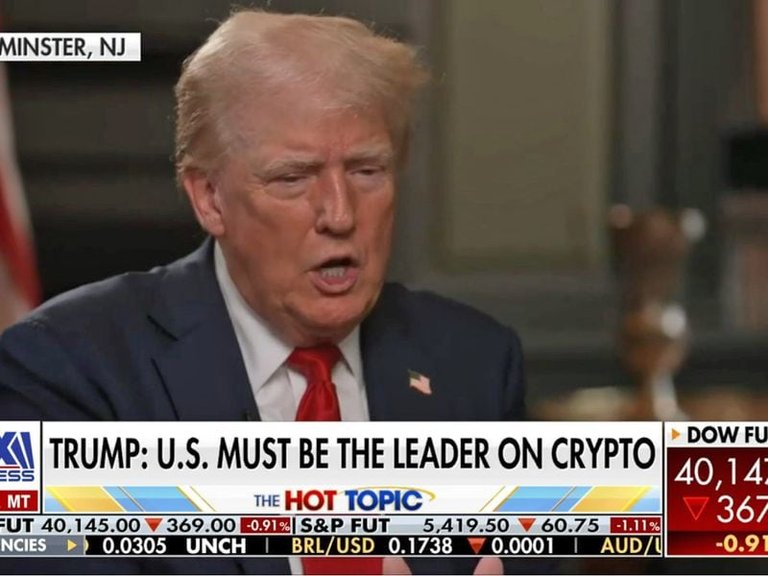
Have you ever wondered if a former president could solve the national debt with a little crypto magic? 🪄 It's a question that's been swirling around the political landscape lately, and it's got everyone talking. 🗣️
This week, former President Donald Trump made headlines with his latest crypto pronouncements, suggesting that Bitcoin could be the key to wiping out the U.S.'s $35 trillion debt. 🤯 His comments have sparked a flurry of reactions, with some praising his forward-thinking approach and others questioning his understanding of the complex world of cryptocurrency.
This blog post will delve into Trump's recent crypto musings, exploring his arguments, the potential implications, and the reactions from both sides of the political aisle. 🏛️ We'll also examine the broader context of crypto's role in the U.S. economy and the potential impact of government policy on this rapidly evolving industry.
Trump's Crypto Crusade: A Bitcoin-Fueled Debt Solution?
Trump's recent comments on crypto have been met with a mix of excitement and skepticism. 🤨 He's not the first politician to express interest in the potential of cryptocurrency, but his bold claims about Bitcoin's ability to solve the national debt have raised eyebrows.
Background: The U.S. national debt has been a major concern for decades, with its size and growth rate sparking debates about fiscal responsibility and economic stability. 💰 Trump's suggestion that Bitcoin could be a solution to this problem is a radical departure from traditional economic thinking.
Trump's Argument: Trump argues that the U.S. needs to embrace crypto to stay ahead of China and other countries that are already investing heavily in the technology. 🇨🇳 He believes that Bitcoin's decentralized nature and potential for growth make it a valuable asset that could help the U.S. regain its economic dominance.
The Skeptics: Critics of Trump's proposal point to the volatility of Bitcoin and the lack of regulatory clarity surrounding cryptocurrencies. 📉 They argue that using Bitcoin to pay off the national debt would be risky and could destabilize the financial system.
The Supporters: Proponents of Trump's view argue that Bitcoin's potential for growth and its ability to disrupt traditional financial systems make it a valuable tool for the U.S. government. 📈 They believe that embracing crypto could give the U.S. a competitive edge in the global economy.
The Political Divide: Crypto and the 2024 Election
Trump's crypto comments have injected a new dimension into the 2024 presidential race. 🗳️ While Vice President Kamala Harris hasn't yet made any public statements about her own crypto policy, her campaign has been quick to highlight Trump's remarks, suggesting that they are unrealistic and potentially dangerous.
Harris' Response: The Harris campaign has focused on Trump's past statements about crypto, highlighting his previous skepticism about the technology. 🗣️ They have also pointed to the lack of regulatory clarity surrounding cryptocurrencies, suggesting that Trump's proposal is premature and could lead to financial instability.
The Crypto Community: The crypto community is divided on Trump's proposal, with some seeing it as a positive step towards mainstream adoption and others expressing concerns about his lack of understanding of the technology.
The Future of Crypto in Politics: It's clear that crypto is becoming an increasingly important issue in American politics. 🇺🇸 As the technology continues to evolve and its impact on the economy grows, we can expect to see more debate and discussion about crypto policy in the years to come.
The Broader Context: Crypto and the U.S. Economy
Trump's crypto comments are just one piece of a larger puzzle. 🧩 The U.S. government is grappling with how to regulate cryptocurrencies and their growing influence on the financial system.
Regulatory Uncertainty: The lack of clear regulatory frameworks for cryptocurrencies has created uncertainty for businesses and investors. ⚖️ The U.S. Securities and Exchange Commission (SEC) has been particularly active in cracking down on crypto companies, leading to legal battles and a chilling effect on innovation.
The Global Landscape: While the U.S. is still trying to figure out how to regulate crypto, other countries are moving ahead with more welcoming policies. 🌎 This could give other nations a competitive advantage in the global crypto market.
The Future of Crypto in the U.S.: The future of crypto in the U.S. depends on how the government chooses to regulate the industry. 🔮 A clear and consistent regulatory framework could foster innovation and attract investment, while a heavy-handed approach could stifle growth and drive businesses overseas.
Conclusion: Crypto's Role in the U.S. Future
Trump's crypto comments have sparked a lively debate about the role of cryptocurrency in the U.S. economy. 🇺🇸 While his proposal to use Bitcoin to pay off the national debt may be unrealistic, it highlights the growing importance of crypto in the political landscape.
As the crypto industry continues to evolve, it's crucial for policymakers to develop a clear and consistent regulatory framework that fosters innovation while protecting consumers. ⚖️ The future of crypto in the U.S. depends on the choices that are made today.
What do you think? Should the U.S. government embrace crypto? What are the potential benefits and risks? Share your thoughts in the comments below! 👇
Remember: This blog post is for informational purposes only and should not be considered financial advice.
At the end of the day self-custody crypto takes power away from the state and transfers it to the individual, so only in some rare cases are governments willing to adopt it. Nations that don't mind giving up some of their power should certainly allow their citizens to participate.
But personally I don't think the traditional nation state survives as crypto gains more widespread adoption.